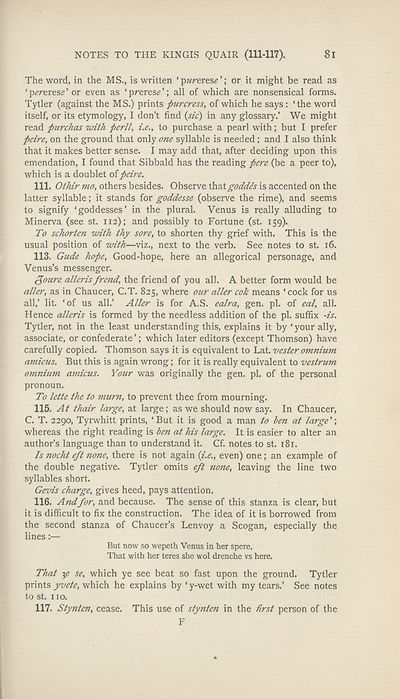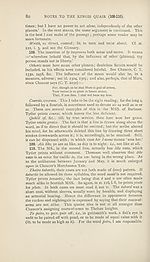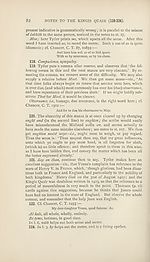Download files
Complete book:
Individual page:
Thumbnail gallery: Grid view | List view

NOTES TO THE KINGIS QUAIR (111-117).
8l
The word, in the MS., is written ‘ ^urtvtse'\ or it might be read as
‘p^rerese’or even as ‘preres^’; all of which are nonsensical forms.
Tytler (against the MS.) prints purcress, of which he says: ‘the word
itself, or its etymology, I don’t find (sic) in any glossary.’ We might
read purchas with peril, i-e., to purchase a pearl with; but I prefer
peire, on the ground that only one syllable is needed ; and I also think
that it makes better sense. I may add that, after deciding upon this
emendation, I found that Sibbald has the reading pere (be a peer to),
which is a doublet oipeire.
111. Othir mo, others besides. Observe \h2\g0ddes is accented on the
latter syllable; it stands for goddesse (observe the rime), and seems
to signify ‘goddesses’ in the plural. Venus is really alluding to
Minerva (see st. 112); and possibly to Fortune (st. 159).
To schorten with thy sore, to shorten thy grief with. This is the
usual position of with—viz., next to the verb. See notes to st. 16.
113. Glide hope, Good-hope, here an allegorical personage, and
Venus’s messenger.
goitre alleris frend, the friend of you all. A better form would be
aller, as in Chaucer, C.T. 825, where our aller cok means ‘cock for us
all,’ lit. ‘of us all.’ Aller is for A.S. ealra, gen. pi. of eal, all.
Hence alleris is formed by the needless addition of the pi. suffix -is.
Tytler, not in the least understanding this, explains it by ‘your ally,
associate, or confederate ’; which later editors (except Thomson) have
carefully copied. Thomson says it is equivalent to Lat. vester omnium
amicus. But this is again wrong; for it is really equivalent to vestrum
omnium amicus. Your was originally the gen. pi. of the personal
pronoun.
To lette the to mum, to prevent thee from mourning.
115. At thair large, at large; as we should now say. In Chaucer,
C. T. 2290, Tyrwhitt prints, ‘But it is good a man to ben at large'-,
whereas the right reading is ben at his large. It is easier to alter an
author’s language than to understand it. Cf. notes to st. 181.
Is nocht eft none, there is not again (i.e., even) one ; an example of
the double negative. Tytler omits eft none, leaving the line two
syllables short.
Gevis charge, gives heed, pays attention.
116. Andfor, and because. The sense of this stanza is clear, but
it is difficult to fix the construction. The idea of it is borrowed from
the second stanza of Chaucer’s Lenvoy a Scogan, especially the
lines:—
But now so wepeth Venus in her spere,
That with her teres she wol drenche vs here.
That y se, which ye see beat so fast upon the ground. Tytler
prints yvete, which he explains by ‘ y-wet with my tears.’ See notes
to st. 110.
117. Stynten, cease. This use of stynten in the drst person of the
F
8l
The word, in the MS., is written ‘ ^urtvtse'\ or it might be read as
‘p^rerese’or even as ‘preres^’; all of which are nonsensical forms.
Tytler (against the MS.) prints purcress, of which he says: ‘the word
itself, or its etymology, I don’t find (sic) in any glossary.’ We might
read purchas with peril, i-e., to purchase a pearl with; but I prefer
peire, on the ground that only one syllable is needed ; and I also think
that it makes better sense. I may add that, after deciding upon this
emendation, I found that Sibbald has the reading pere (be a peer to),
which is a doublet oipeire.
111. Othir mo, others besides. Observe \h2\g0ddes is accented on the
latter syllable; it stands for goddesse (observe the rime), and seems
to signify ‘goddesses’ in the plural. Venus is really alluding to
Minerva (see st. 112); and possibly to Fortune (st. 159).
To schorten with thy sore, to shorten thy grief with. This is the
usual position of with—viz., next to the verb. See notes to st. 16.
113. Glide hope, Good-hope, here an allegorical personage, and
Venus’s messenger.
goitre alleris frend, the friend of you all. A better form would be
aller, as in Chaucer, C.T. 825, where our aller cok means ‘cock for us
all,’ lit. ‘of us all.’ Aller is for A.S. ealra, gen. pi. of eal, all.
Hence alleris is formed by the needless addition of the pi. suffix -is.
Tytler, not in the least understanding this, explains it by ‘your ally,
associate, or confederate ’; which later editors (except Thomson) have
carefully copied. Thomson says it is equivalent to Lat. vester omnium
amicus. But this is again wrong; for it is really equivalent to vestrum
omnium amicus. Your was originally the gen. pi. of the personal
pronoun.
To lette the to mum, to prevent thee from mourning.
115. At thair large, at large; as we should now say. In Chaucer,
C. T. 2290, Tyrwhitt prints, ‘But it is good a man to ben at large'-,
whereas the right reading is ben at his large. It is easier to alter an
author’s language than to understand it. Cf. notes to st. 181.
Is nocht eft none, there is not again (i.e., even) one ; an example of
the double negative. Tytler omits eft none, leaving the line two
syllables short.
Gevis charge, gives heed, pays attention.
116. Andfor, and because. The sense of this stanza is clear, but
it is difficult to fix the construction. The idea of it is borrowed from
the second stanza of Chaucer’s Lenvoy a Scogan, especially the
lines:—
But now so wepeth Venus in her spere,
That with her teres she wol drenche vs here.
That y se, which ye see beat so fast upon the ground. Tytler
prints yvete, which he explains by ‘ y-wet with my tears.’ See notes
to st. 110.
117. Stynten, cease. This use of stynten in the drst person of the
F
Set display mode to: Large image | Zoom image | Transcription
Images and transcriptions on this page, including medium image downloads, may be used under the Creative Commons Attribution 4.0 International Licence unless otherwise stated. ![]()
| Publications by Scottish clubs > Scottish Text Society publications > Old series > Kingis quair > (141) |
|---|
| Permanent URL | https://digital.nls.uk/106994167 |
|---|
| Description | A collection of over 100 Scottish texts dating from around 1400 to 1700. Most titles are in Scots, and include editions of poetry, drama, and prose by major Scottish writers such as John Barbour, William Dunbar, Gavin Douglas, and George Buchanan. Edited by a key scholarly publisher of Scotland's literary history, and published from the late 19th century onwards by the Scottish Text Society. Available here are STS series 1-3. |
|---|

